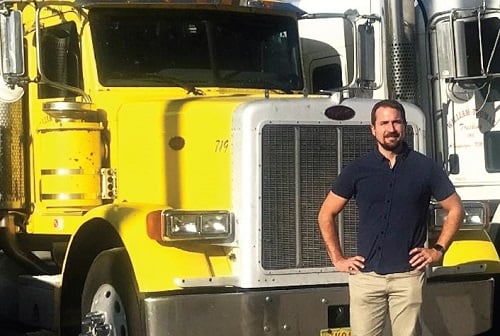

Heffernan Insurance Brokers’ Kenny Planeta chats with Heather Turner about where the rubber hits the road in trucking insurance
IBA: What’s the biggest trend affecting the transportation sector today?
Kenny Planeta: The biggest thing we’re dealing with right now is huge lawsuits with even bigger verdicts. I’ve been doing this for 14 years, and I can say that I’ve never seen so many lawsuits as I have over the past five years. I don’t think trucking companies have gotten worse, but rather the lawsuits have gotten better. Plaintiff attorneys have a playbook for handling commercial truck accidents, and they are all sharing it.
When a truck hits a car, it can be catastrophic, and injury attorneys know trucking companies all carry at least $1 million in liability, whether it’s a small mom-and-pop shop or a large fleet company that carries even more in liability. The insurance carriers are forced to keep the cases out of court and push for settlements even in cases where the truck is not at fault. This has caused poor underwriting results, which are driving increases in premiums.
IBA: What’s the biggest challenge you face when insuring this sector?
KP: Commercial auto is a very hard-to-place coverage, and we have fewer and fewer carriers in the space because of poor underwriting results. We are dealing with a lot of non-renewals, and those who are still writing commercial auto are raising rates significantly, which has created a market squeeze.
IBA: How does Heffernan Insurance Brokers overcome this challenge?
KP: We like to jump in way ahead of the renewal process. We don’t want to come in 90 days out and market the insurance then because fewer carriers are now writing trucking insurance. We talk to the client in a year-long process, learn their challenges, and then it’s about getting underwriters engaged in the risk.
We have to get to know the client inside and out in order to sell them to the right insurance market and find not just a one-year insurance carrier, but a carrier that will stick with them for years. We work toward a long-term strategy that’s a win-win for the client and carrier.
IBA: How has technology impacted the trucking sector?
KP: Last year, the electronic logging device [ELD] mandate went into effect, which tracks drivers’ hours of driving. This used to be done on paper, but now a computer tracks driving hours so there is no way to fake it. This has impacted the lawsuits that are happening. Before, with paper logs, it was more difficult for a plaintiff attorney to determine where a truck was, how fast it was going or
whether it was within operating hours. Now all of that info is right in the ELD if an accident happens.
Many trucking companies are also starting to put cameras in their trucks, which has been a positive trend, but because it’s not mandated yet, many people are afraid to invest more money when margins are already so thin in this industry. We work with clients to show them how this type of voluntary technology can be implemented into their overall risk management strategy and go hand-in-hand with the insurance they are purchasing.
There is so much technology, data and information available out there, but finding carriers that use the information as part of the underwriting and pricing process is a challenge.
IBA: What makes this area so unique for brokers?
KP: Trucking insurance is such a high-level term – in reality, there are so many sub-sectors within trucking. When someone says they run a trucking company, the question is what type. There’s the long-haul dry freight, refrigerated and flatbed as your traditional trucking, but with the growth of Amazon, there’s a segment exploding called final-mile delivery. There are specific industry trucking operations, such as oilfield trucking and construction-related hauling like dumping operations and heavy haul, that are their own sectors.
That’s something unique about this industry. There’s not just one insurance company we deal with for all types of trucking; it is very niche-focused.
